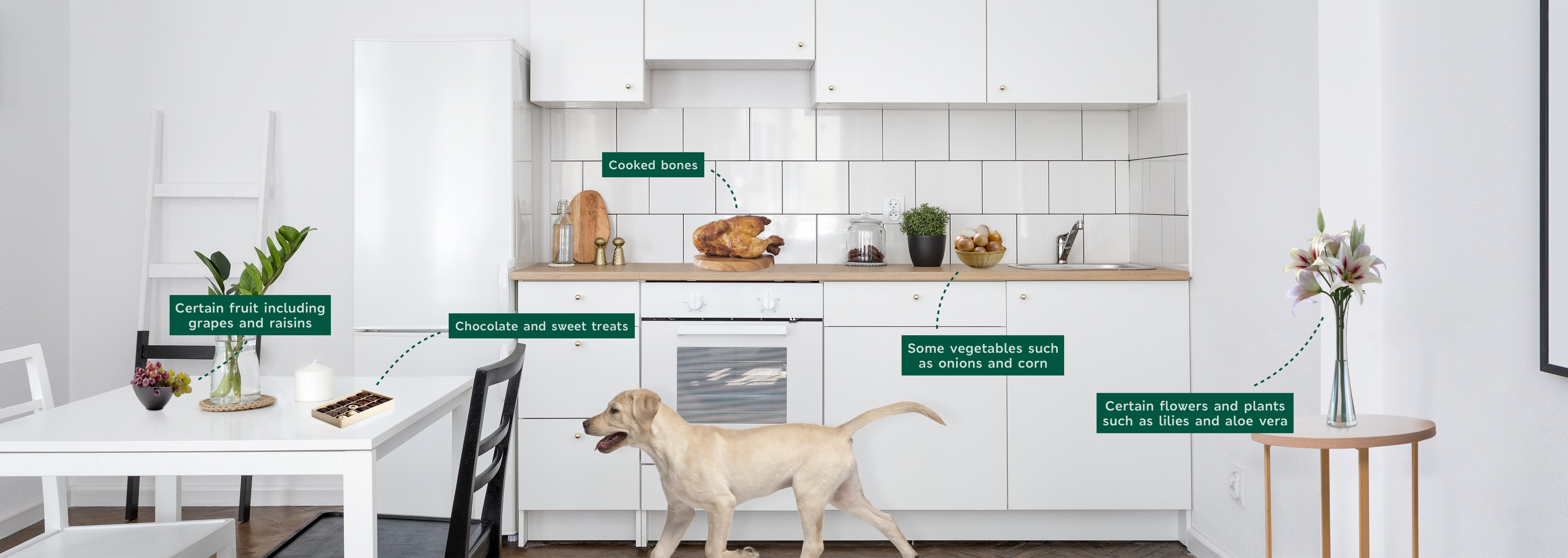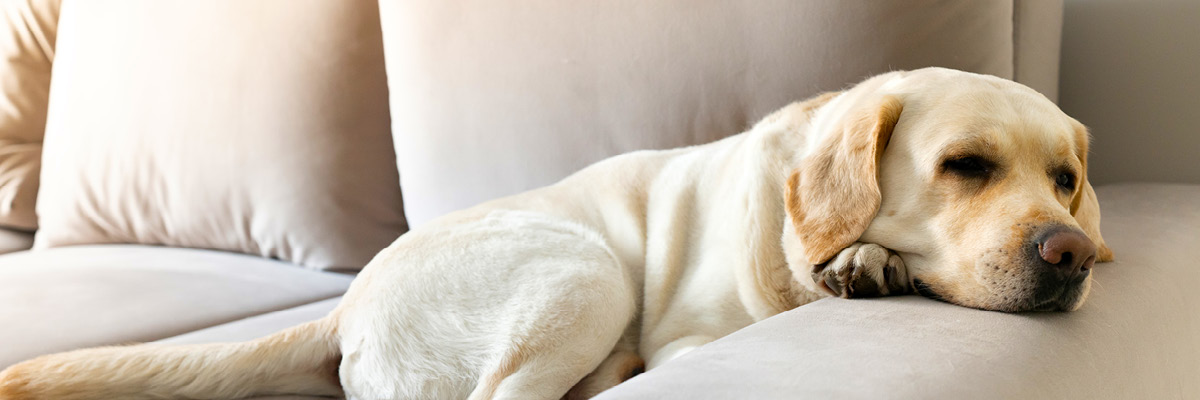Caring for your pet
Information and guidance to help you look after your pet, the way they look after you
Your guide to pet health
Pets are important not only as an integral part of the family unit, but as a source of company and comfort, providing therapeutic qualities when we need it most. They help us to enjoy the simple things in life; be it a morning walk or the joyful moment of returning home after a long day.
In short, pets help us to live our best lives, and there are different ways we can help them to live theirs.
Below is some useful guidance and information to help you when looking after your pet, so you can best protect them and keep them healthy and happy, while keeping yourself healthy and happy too.
Household dangers for your pet
Our pets remind us that home is where the heart is, but our homes often contain things that can be hazardous to pets and lead to a pet insurance claim.
Learning about the potential dangers, such as what foods are toxic for dogs or cats, is an important part of caring for your pets.
Explore the image and information below to learn more about the things that pose a risk to curious paws.*

Toxic food for dogs and cats
There are certain food types that can be toxic for dogs and cats and they can even be fatal. Below we have listed different types to be aware of to help you look after your pet:
Chocolate and sweet treats:
Human chocolate contains theobromine, a chemical that can be fatal to pets. The darker the chocolate, the higher the risk. Keep pets away from any foods containing chocolate, such as cakes, sweets, cookies and cocoa powder. Xylitol, which is found in sugar-free sweets, is also extremely harmful to dogs, so make sure any of these products are stored safely away too.
Cooked bones:
These can get stuck in your pet's stomach and cause blockages, or splinters of bone can cause internal damage. They can also cause fractures to your pet's teeth, stomach pain and constipation. Make sure you keep them out of reach or discard of them safely when you've finished with them.
Some vegetables, such as garlic and onions:
Some vegetables contain chemicals which can poison dogs and cats when eaten in large quantities, but exposure to concentrated forms such as garlic powder can also be toxic. Again, these should be kept safely out of reach.
Garden dangers for your pet
It is important to be aware that some plants and flowers are best kept well away from pets, as pets can be poisoned by eating or chewing the leaves, stems or flower heads, and even the pollen can be harmful. If in doubt, ask your local nursery or florist for advice before bringing a new plant into your home.
What are the signs of plant poisoning in pets?
If you see your pet eating a plant or flower, it is important to contact your vet as soon as possible to get their advice.
However it isn’t always easy to catch a pet eating a plant or flower, but there are signs you can look out for, including*:
- Low energy
- Vomiting
- Diarrhoea
- Blood in the poo
- Drinking/peeing more
- Pale gums
- Twitching
- Tremors/seizures (fits)
- Struggling to breathe
- Collapse
- Drooling
- Eating less/not eating
You can learn more about poisonous plants for pets from PDSA.
*Information taken from https://www.pdsa.org.uk/
Tips on keeping your dog happy and healthy
Dogs wriggle their way into our hearts - and occasionally worm their way into trouble. But although we never know what life will bring, vet surgeon Martin Stevens has some simple steps you can take to keep your dog happy and healthy from nose to tail:
Provide the basics
Keep them entertained
Watch your food
If they're home alone... take them out on a long walk before you leave
Do home check-ups
Groom them
Common questions about pet health
If you'd like some advice before deciding whether to go to your vet, we've got you covered. Martin answers all the burning questions about your dog or cat's health - whether you're a seasoned dog owner or you've just brought home your first kitten.
Can dogs get colds?
They can. Thankfully they won't catch them from us, but they can get runny noses and coughs. If you're worried about your pet, you should contact your vet.
What pet should I get?
Tough question. But I think the best pet is one that is well-fed, well-looked after and insured.
How do I get a pet passport?
The regulations for pet passports are constantly changing. Best bet is to contact your vet who can give you advice for taking your pet abroad, or check GOV.UK. A current EU pet passport issued in GB will not be valid for travel to the EU or NI from 1 January 2021.
Why do dogs bark?
To communicate! They can vary the tone, length and pitch of their bark to tell us different things. But trying to work out what they're saying is a different matter!
What should I look for when getting pet insurance?
M&S Bank have lots of information regarding pet insurance on their website, including what type of M&S Pet Insurance policies are available to you and your pet as well as common types of pet insurance claims.
Are cats' noses supposed to be wet?
They'll be wet from time to time. They have sweat glands in there, so they'll get a little wet when they're hot. If there's ever any thick discharge or crustiness, it's time to contact your vet.
Why do dogs vomit?
This could be something really simple like a bit of tummy upset from something they've eaten, but it could be a bit more serious. If you're worried about your dog, I'd always advise you contact your vet.
Are dogs' worms contagious to humans?
Unfortunately, some of them are. That's why it's really important that you have your pet wormed regularly, and always clear up dog faeces outside - especially if you have kids!
Why are cats scared of cucumbers?
I don't think this is entirely true, although it has been a big social media trend! They might think they're snakes, but generally they might not like something large, bright and unfamiliar being thrown at them.
What can I do to keep my pet cool in hot weather?
Dogs should never be left in a hot car! When they're hot, use wet towels to cool them down and give them plenty of water to drink. Try to avoid the hotter times of the day for walks, and they should have a nice safe summer.
What do cats' meows mean?
They can mean a variety of things. Usually they're talking to us - that really long 'yowl' you hear when you're in a different room is a contact call, saying "hey, come and find me!"
Will dog food make a cat sick?
It can do if the cat's allergic to the ingredients, but the other way around is more worrying. Cat food is higher in fat which can make dogs poorly.
What Christmas treats should my pet avoid?
Definitely alcohol and chocolate. Raisins and grapes are actually really poisonous, which rules out Christmas pudding and Christmas cake. The best thing for a treat is to pick the meat they normally have in pet food, like beef or chicken, from your Christmas dinner, and give it to them fresh as a treat.
What can I do if my pet is scared of fireworks?
If you can, try to desensitise them in advance. There are CDs out there which gradually make fireworks less scary for dogs. Takes a couple months to do, so it's best to start early.
Are dog fleas harmful to humans?
They won't live on us, but if you're allergic you'll have a little reaction - a small red bump might come up like a mosquito bite.
